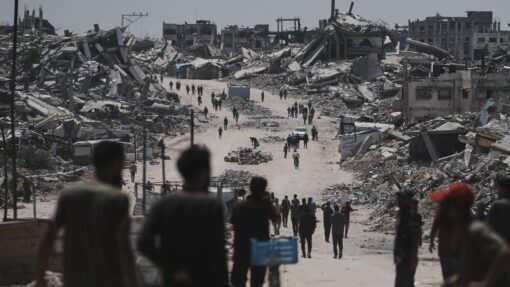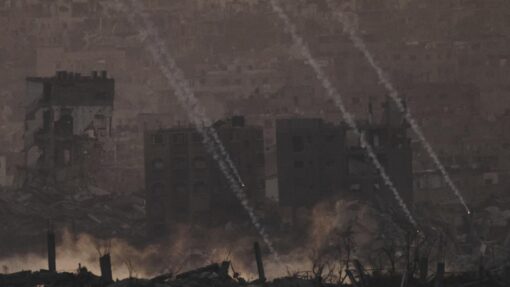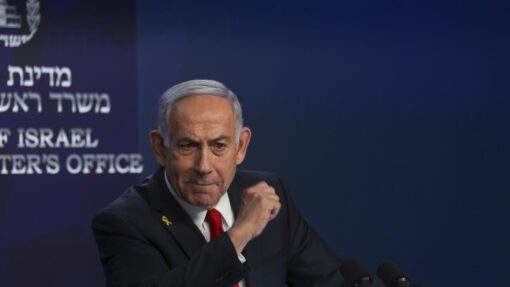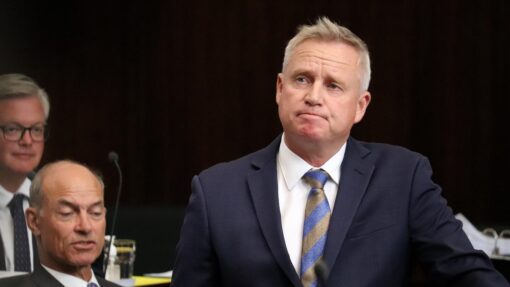Albanese argues for political settlement in Middle East
Paul Osborne, Andrew Brown and Tess Ikonomou |
Anthony Albanese says a political settlement is needed in the Middle East, as the Hamas-Israel war continues.
The prime minister told a Labor caucus meeting in Canberra on Tuesday it was important to be unequivocal in opposition to what happened on October 7, while also acknowledging there have been too many civilian deaths in Gaza.
“At the end of this, we need a political settlement,” he said.

Mr Albanese said Jewish, Muslim and Palestinian Australians were “really hurting at the moment”.
Many in Muslim and Palestinian communities felt hurt, believing there had been less emphasis on Palestinian lives, he said.
Mr Albanese also criticised the rising level of anti-Semitism and a pro-Palestinian motorcade through Sydney’s east.
“We have a responsibility to de-escalate tensions,” he said.
The caucus was told of concerns about the level of misinformation in the community regarding Australia’s role in the Middle East.
Mr Albanese said there was no direct Australian involvement or supply of weapons.
Opposition Leader Peter Dutton told a coalition partyroom meeting the prime minister had been “found wanting” during the conflict in the Middle East.
He criticised comments from Foreign Minister Penny Wong calling for an Israeli ceasefire.
“Her comments suggest Labor’s hearts aren’t in it and they are divided over this issue,” Mr Dutton said.

“We will not stand by and watch Australians vilified for their religion or their heritage.”
Liberal MP Julian Leeser told the meeting Australia had gone from having “the best prime minister on Israel to the worst prime minister on Israel”.
A Resolve poll published in Nine newspapers on Tuesday, found 36 per cent believe Australia is less safe, while 32 per cent disagreed and 32 per cent were unsure.
The results come after a series of rallies and clashes in major capital cities since Hamas attacked Israel’s southern region, killing more than 1200 people and taking in excess of 200 hostages.
In response, Israel declared war on Hamas which runs the Gaza strip, and is considered a terrorist group by the government.
Palestinian officials say more than 11,000 Gaza residents have been killed in air and artillery strikes.
In a heated exchange with a Greens senator, Senator Wong told parliament leaders should not be “amplifying distress” which could lead to violence.
“I believe leadership is trying to hold our country together and unifying our community and standing against all forms of prejudice and hatred,” she told parliament.
In Australia, there have been pro-Palestine rallies – some of which have been criticised for the use of anti-Semitic rhetoric and intimidation – and pro-Israel rallies by members of the Jewish community calling for those kidnapped to be released.
UN special rapporteur for the occupied Palestinian territory Francesca Albanese told the National Press Club a ceasefire was needed in addition to a plan to undo occupation.
“Let’s assume Israel manages to kill all the 20,000 Hamas operatives … but still keep the Palestinians under occupation – another form of resistance like this will emerge,” she said.
Organisers of a pro-Palestine rally have encouraged Victorian students to stage a lunchtime walkout from school.
The school strike for Palestine has been called for November 23 across Melbourne after the city drew 45,000 demonstrators on Sunday to a rally calling for an end to the war in Gaza.
AAP


